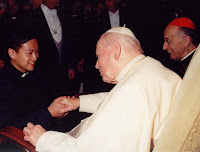 The prelude was an unexpected private meeting in the afternoon of August 4. I was browsing through the shelves of Solidaridad, the bookstore at Padre Faura, as has always been my wont whenever I passed by that area in Ermita. I looked at the books written by F. Sionil Jose and saw his latest—the novel Vibora! among those displayed. There were new translations to his novels, particularly one that caught my eye—the Italian version of Viajero. I bought several titles: Vibora!, Olvidon, Ermita, Sin, Three Filipino Women and Gagamba. I reminded myself that I was teaching fiction in my creative writing class and thus needed to get familiar once again with the genre by reading. As I paid for the books, just out of curiosity, I asked the cashier whether it was possible to have my books signed by Mr. Jose himself who owned the book shop. I was delighted when I heard the affirmative. In a few minutes, I was asked to enter his study and after a short while I was face to face with the literary giant, our very own best bet for the Nobel in Literature; the 1980 Ramon Magsaysay Awardee for Literature; our 2001 National Artist and 2004 Pablo Neruda Centennial Awardee bestowed by the government of Chile; the Filipino novelist translated into 28 languages…
The prelude was an unexpected private meeting in the afternoon of August 4. I was browsing through the shelves of Solidaridad, the bookstore at Padre Faura, as has always been my wont whenever I passed by that area in Ermita. I looked at the books written by F. Sionil Jose and saw his latest—the novel Vibora! among those displayed. There were new translations to his novels, particularly one that caught my eye—the Italian version of Viajero. I bought several titles: Vibora!, Olvidon, Ermita, Sin, Three Filipino Women and Gagamba. I reminded myself that I was teaching fiction in my creative writing class and thus needed to get familiar once again with the genre by reading. As I paid for the books, just out of curiosity, I asked the cashier whether it was possible to have my books signed by Mr. Jose himself who owned the book shop. I was delighted when I heard the affirmative. In a few minutes, I was asked to enter his study and after a short while I was face to face with the literary giant, our very own best bet for the Nobel in Literature; the 1980 Ramon Magsaysay Awardee for Literature; our 2001 National Artist and 2004 Pablo Neruda Centennial Awardee bestowed by the government of Chile; the Filipino novelist translated into 28 languages…And I realized the reason for this familiarity: it was because I have known the author through his writings; I read them and have savored the words and the experiences that they represented. In the end I asked for the possibility of him giving a short lecture to my class in creative writing and he gladly acceded to my request.
This is true for any other work, great or small. In the last analysis, little failures would not count so much because of the good that we have done consistently.

No comments:
Post a Comment